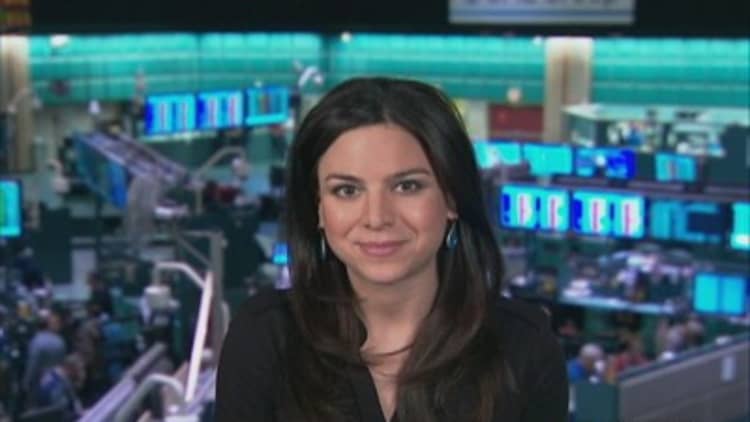U.S. stocks declined on Friday, with the Nasdaq Composite posting its first weekly drop in six, as concern escalated about Ukraine, two days before a vote in Crimea on joining Russia.
(Read: Traders eye Ukraine as Crimea referendum looms)
The CBOE Volatility Index (VIX), a measure of investor uncertainty, spiked nearly 9.3 percent to 17.73.
"The market is volatile, but not too volatile to cause any problems yet. The problem with yesterday was we had a lot of better economic news. I know there is concern about Ukraine and also China, but we had good numbers, yet couldn't maintain a rally," said Bruce Bruce Bittles, chief investment strategist at RW Baird.
"Maybe we're in a topping phase," he added.
U.S. Secretary of State John Kerry and Russian Foreign Minister Sergei Lavrov met in London Friday, and were unable to alleviate the situation. Russia had warned Ukraine's government had lost control of the nation, and the U.S. and the European Union said Russia would face sanctions if it does not back off from taking control of Crimea, where a referendum is scheduled for Sunday on whether to join Russia.
Kerry told a televised news conference that Russian President Vladimir Putin was not ready to "make any decision regarding Ukraine until after the referendum on Sunday."
A preliminary report from Thomson Reuters/University of Michigan had consumer sentiment at 79.9 in March versus an 82 estimate.
"The consumer is showing a lot of skepticism, even pessimism, about the economy. So here we have optimism in the stock market from investors but we don't have optimism from Main Street," said Bittles.
Separate economic data showed producer prices unexpectedly fell last month, with the 0.1 percent decline in the producer-price index coming after a 0.2 percent climb in January, the Labor Department said.
Major U.S. Indexes
"Climbing this wall of worry is a good thing, if everybody was in, and everybody felt good about, it would probably not be a good time to get in," said Vern Sumnicht, CEO of iSectors, an ETF-based investment management firm.
Sumnicht views the stock market as fairly valued, saying: "there's not much room for the market to go up in the next couple of years in the multiple, but it will go up because of the earnings of the companies themselves; they're doing well," Sumnicht said.
Benchmark indexes fluctuated between gains and losses throughout the morning and continuing into the afternoon, falling to session lows shortly before the close.
Extending its slide into a fifth session and losing 2.4 percent for the week, the Dow Jones Industrial Average declined 43.22 points, or 0.3 percent, to 16,065.67, with 20 of its 30 components in the red.
After spending much of the day stepping in and out of positive terrain for 2014, the declined 5.21 points, or 0.3 percent, to 1,841.13, with utilities the best performing and technology faring the worst among its 10 major industry groups. The S&P fell 2 percent for the week, and ended the session down 0.4 percent for 2014.
Down 2.1 percent for the year, its worst weekly decline in 11 months, the Nasdaq shed 15.02 points, or 0.4 percent, at 4,245.40.
Advancers outdid decliners by a roughly 4-to-3 ratio on the New York Stock Exchange, where 640 million shares traded. Composite volume neared 3.3 billion.

The dollar declined against the currencies of major U.S. trading partners; the 10-year Treasury yield, using in determining mortgage rates and other consumer loans, held at 2.65 percent.
The rise in U.S. Treasury prices, which move inversely to yields, illustrates "a flight to safety here, from foreigners at least, and a reflection of economic conditions. There's no strong evidence that the U.S. economy ready to reach escape velocity," said Bittles.
Crude-oil futures rose 69 cents, or 0.7 percent, to $98.89 a barrel; gold futures climbed $6.60, or 0.5 percent, to $1,379.00 an ounce.
Stocks declined on Thursday, with the Dow Jones Industrial Average falling more than 200 points, on worries about China's economy and the Ukraine.
—By CNBC's Kate Gibson
More From CNBC.com:


